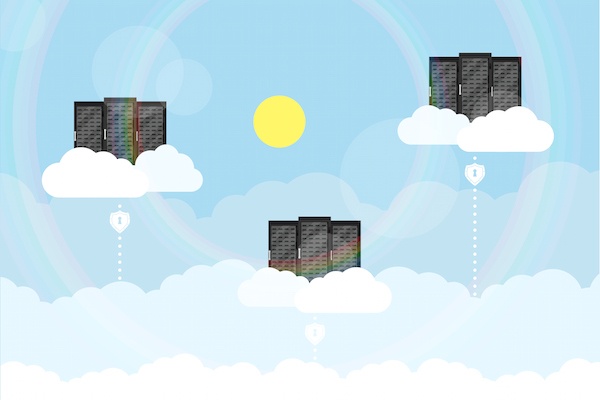The buzzwords of the Internet telephony world are getting increasingly hard to distinguish from each other. Terms such as 'business VoIP' and 'cloud phone system' are used without definition, often multiple times per page, and sometimes interchangeably.
Despite the divergent language, there's actually very little that separates these two terms from each other. Cloud phone systems and business VoIP essentially offer the same phone system functionality.
Business VoIP: The Modern Day PBX

Business VoIP is a broad term that represents many Internet based VoIP services. Despite changing technology, the rationale for using a business phone system is still the same as it was forty years ago. Companies who use business VoIP want to:
- Avoid paying for individual phone lines run on residential wiring.
- Have internal calling (extension dialing) and external calling on the same service.
- Implement valuable phone system features.
Business VoIP services aim to fully replace analog PBXes that run on Plain Old Telephone Service (POTS). Analog PBXes were very popular throughout the 20th century. But with changes in communications technology, the copper wiring and physical hardware that analog PBXes required to run became obsolete. VoIP services eliminated the need for extra wiring and hardware, because VoIP is powered entirely by broadband Internet.
When people mention business VoIP, they are referring to phone systems that were designed to replace and surpass the analog PBX that businesses used to rely on. That's why all the major business VoIP providers offer features that were once exclusive to analog PBXes only. Auto attendants, queues, multi-party conferencing, and busy lamp field are just a few of the features business VoIP providers have appropriated and improved upon.
Business VoIP can cut costs in equipment, maintenance and repair, per minute charges, and per feature charges. Business VoIP allows small and medium sized businesses to access enterprise grade features normally reserved for large corporations. This levels the playing field by making once costly features affordable to businesses of all stripes.
Cloud Phone System: Unified Communications
Several business VoIP services are now co-branded or rebranded as cloud phone systems. The terms are sometimes used interchangeably on the same web page to refer to the same service. There's not much a difference, upon a close examination, of these two offerings.
The "cloud" is simply a way to describe how a VoIP company's servers interact with each other. There's very little that distinguishes a cloud service from a "hosted" business VoIP service. Cloud is simply and extension of hosted: they both mean that the VoIP company maintains and owns the hardware of the phone service. The cloud moniker is merely a figurative way of illustrating how these VoIP servers shuffle information.
If there's so much in common with business VoIP and cloud phone systems, then why are there separate terms to begin with?
It's true that most cloud phone systems maintain leading business VoIP features, such as auto attendants, ACD queues, and call monitoring. And in many cases, the cloud phone system itself was probably once marketed as a PBX of some sort. But cloud phone systems do away with the PBX metaphor and instead settle for a different concept: Unified Communications (UC).
Instead, every device with an Internet connection becomes a potential phone, including laptops, tablets, and smartphones. UC innovations such as web phones and softphones can call the Public Switch Telephone Network (PSTN), extension dial, video call, and manage voicemail.
Cloud systems offer ways to communicate with your team with collaboration features such as real-time presence, instant messaging, call analytics, and click-to-call functionality. Many cloud phone systems retain some kind of standard PBX features, although some newer options do away with the desk phone altogether.
Business VoIP vs. Cloud Phone System

Whether or not a company claims to offer business VoIP, a cloud phone system, both, or none, it's ultimately up to you to decide what service is right your business. Peel back the labels, do some research, and find out what features fit your company. See our VoIP Comparison series for more information on the offerings of specific VoIP companies.


